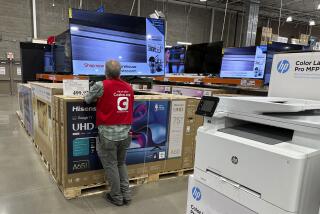If I’m So Rich, Why Am I Broke?
We are constantly told that there is next to no inflation in this country. In 1998, prices, as measured by various indices employed by the U.S. government, rose by about 2%. And in this year, we are further assured by Federal Reserve Chairman Alan Greenspan, among others, that this historically low rate of inflation is expected to continue. Rightly, this is hailed as good news. But, for some mysterious reason, the figures don’t add up the same way when I stop and calculate my own expenses.
Statistics are one thing. But actual price increases faced by Americans are something else. For my family, inflation is raging out of control. With the new year, our health insurance, along with that of all other couples who are individual, as distinguished from employer-supported, subscribers to Kaiser Permanente, rose by a dizzying $51 per month, making our monthly payment $324, an increase of nearly 20%. Hard on the heels of this knock came news that the rent on the apartment where we’ve lived since the 1970s is going up by $210 a month to $1,085--a similar, roughly 20% rise.
Rent and health insurance make up the lion’s share of our expenses. And they are rising at 10 times the rate of inflation. Both of these are items that need to be paid every month. Neither is an optional expense. Neither is likely ever to go down. Whatever the rate of inflation coming out of Washington, these rates are likely to go on rising.
True, gasoline prices are lower than they were, but this commodity is a tiny portion of household expenditures. Electronic equipment, most of it made in Asia, is supposed to be a bargain. Yet while prices of stereos, VCRs, televisions and the like have not gone up, and may even have fallen slightly, recent trips to the stores show that if anyone is truly benefiting from the Asian financial crisis and the collapse of some Asian currencies, it is not the American retail consumer.
And anyone hoping to take a vacation from it all is not likely to find any escape from high prices. The price of a hotel room in this region, it was recently reported, rose sharply over the past year despite low rates of occupancy. And anyone who dines out will have noticed the rising prices in Los Angeles-area restaurants this past year. Nor can one escape the problem by preparing every meal at home. The shrinking number of supermarket chains in this area has contributed to rising food prices. Milk, in particular, has gone up steeply, as have its byproducts, such as butter and cream. El Nino has contributed to noticeably higher prices for fruits and vegetables, even as Americans are being urged to consume more of them for health reasons.
So, inflation is low, but the things we actually buy are higher. Macro statistics may be valid on some level, but, on a personal level, where it matters, there is no mistaking the vastly increased outflow of money in order to purchase exactly the same housing, health insurance and food, which many people are experiencing right here and right now. If this is not inflation, I don’t know what is.
More to Read
Inside the business of entertainment
The Wide Shot brings you news, analysis and insights on everything from streaming wars to production — and what it all means for the future.
You may occasionally receive promotional content from the Los Angeles Times.










